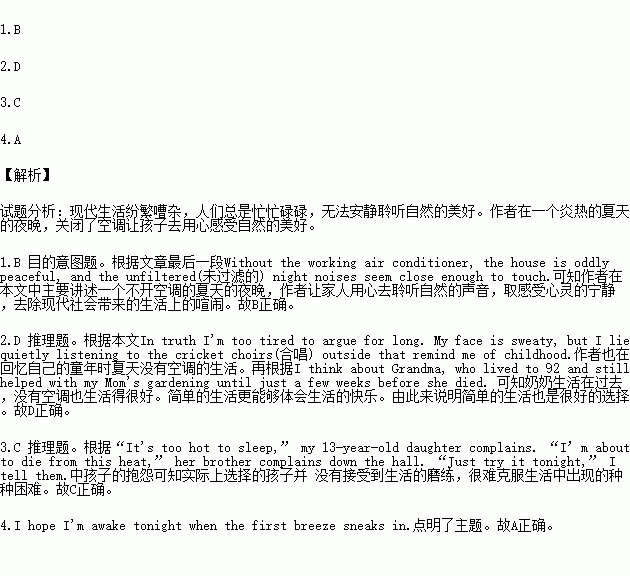题目内容
Lie in bed, by an open window, and listen…
“No air conditioning? How can you sleep?” a friend asks, horrified. I tell her my family has decided to shut the air conditioner off and reduce our electric bill.
On this first night of our cost-cutting adventure, it's only 85 degrees. We're not going to suffer, but the three kids complain anyway.
They've grown up in 72-degree comfort, protected from the world outside.
“How do you open these windows?” my husband asks. Shaking the metal ribs(插销), he finally releases one. Bug bodies decorate the window shelf. As we spring the windows one by one, the night noises howl outside---and in.
“It's too hot to sleep,” my 13-year-old daughter complains. “I’m about to die from this heat,” her brother complains down the hall. “Just try it tonight,” I tell them. In truth I'm too tired to argue for long. My face is sweaty, but I lie quietly listening to the cricket choirs(合唱) outside that remind me of childhood.
The neighbor's dog howls. Probably a passing squirrel. It's been years since I've taken the time to really listen to the night.
I think about Grandma, who lived to 92 and still helped with my Mom's gardening until just a few weeks before she died. And then, I'm back there at her house in the summer heat of my childhood. I move my pillow to the foot of Grandma's bed and angle my face toward the open window. I turn the pillow, hunting for the cooler side.
Grandma sees me turn over and over. “If you'll just watch for the breeze(清风),” she says,“you'll cool off and fall asleep.” She cranks up the Venetian blinds(百叶窗). I stare at the filmy white curtain, willing it to move. Lying still, waiting, I suddenly notice the life outside the window. The bug chorus. Neighbors, porch-sitting late, speak in unclear words that calm me.“Mom, did you hear that?” my seven-year-old son cries. “I think it was an owl family.” “Probably,” I tell him. “Just keep listening…”
Without the working air conditioner, the house is oddly peaceful, and the unfiltered(未过滤的) night noises seem close enough to touch. I hope I'm awake tonight when the first breeze sneaks in.
1.What is the point the writer wants to make in the passage?
A. We should learn to save electricity.
B. A peaceful mind is important in modern life.
C. We should care about the outside world rather than one’s inner world.
D. Modern men live too comfortable a life.
2.The author talks about her grandmother and her childhood to show that _____
A. people used to live a hard life.
B. people at that time were hardworking.
C. she has learned a great deal from her grandma
D. it’s OK for people to live a simple life.
3.In the writer’s eyes, her children are _________________.
A. independent from parents’ protection
B. reliable because of parents’ love
C. lacking in real test of hardships in life
D. full of complaints against life
4.Which of the following title best suits the passage?
A. Waiting for the Breeze
B. An interesting Experience
C. Life at Present and Life in the Past
D. Different Times, Different Children

